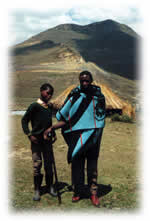 |
 |
||
 |
|||
|
RELATED THEMES employment and income gender health migration resettlement OTHER LOCAL THEMES BACKGROUND |
education
Some feel the influence of education is corrupting, saying that boys and girls become undisciplined and behave badly. One narrator states: "These children are taught even things we consider elderly people's secrets. As a result we are not able to tell them what is good and bad...". Despite these misgivings most narrators see education as a major asset, though some say up to primary level only. One narrator describes the value of education as the fact that "it stays with you": once gained, knowledge cannot be used up the way that money can be, for example, nor can it be stolen the way that their livestock is sometimes. There is general recognition that when they are resettled, those who find themselves without land will prosper only if they are sufficiently educated and able to secure employment. Anxiety about this is accompanied by a sense of sadness among adults that their extensive education in the land around them - their knowledge of the environment in which they and their parents and grandparents grew up - will be of limited value in their new locations. quotes about education"We were happy that our children were going to have the wise peoples' education which would help them to work with both their hands and heads. However, we have been disillusioned because instead they know things that we did not intend to teach them. Now we are failing to make our children do things we want, because of this education." "Because the problem that I see with people who are educated there [are] too many of them. The population has grown and even when you try and go and look for a job with that education of yours, you will find there [are] too many people who are queuing [for] a job like that one that you are looking for. Now it is in the manner that I see maybe it is to waste time that you should go for too high an education. But the main thing is that you should know how to read and write." |
|
 All local schools are related to churches; during the week the space is used as a school and on Sundays as a church. There are primary schools close to the villages but students must travel some distance for secondary education. Many narrators had some years of schooling and most send some of their children to school. Only one narrator mentions being unable to pay school fees for all his children. There is pressure on some children, especially boys (girls only if there are no sons), to become herd-boys. Many narrators left school to take up this role, often later migrating to work in the mines; others attended school until they "eloped".
All local schools are related to churches; during the week the space is used as a school and on Sundays as a church. There are primary schools close to the villages but students must travel some distance for secondary education. Many narrators had some years of schooling and most send some of their children to school. Only one narrator mentions being unable to pay school fees for all his children. There is pressure on some children, especially boys (girls only if there are no sons), to become herd-boys. Many narrators left school to take up this role, often later migrating to work in the mines; others attended school until they "eloped".